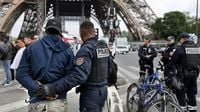On Thursday, April 24, 2025, the Paris Police Prefecture conducted a targeted operation against illegal street vendors, specifically focusing on those selling crepes near the iconic Eiffel Tower and the Iéna bridge. This crackdown, which has become increasingly necessary in recent years, highlights the ongoing struggle between local authorities and unlicensed vendors who have proliferated in the city.
During this operation, police arrested five individuals and seized five carts filled with equipment and goods. Additionally, 25 kilograms of food were destroyed due to sanitary concerns and the adverse effects on local businesses. This measure aims to protect public health and ensure fair competition for established vendors in the area.
In late October 2024, a significant incident underscored the tensions surrounding street vending in Paris. Mourad, the manager of a Carrefour City located on rue Marx-Dormoy, was injured while attempting to disperse illegal vendors congregating outside his store. This incident is part of a broader pattern of conflicts that have arisen in the city, as established merchants express frustration over the impact of illegal vendors on their revenues.
Earlier this year, in January, a violent altercation broke out among cigarette vendors in the 13th arrondissement, leading to one injury and the arrest of ten individuals. Such incidents have raised alarms about the safety and security of both the vendors and the public. In March, merchants near the Eiffel Tower reported significant revenue losses attributed to the presence of these unlicensed sellers, further fueling the debate over street vending regulations.
The statistics surrounding illegal street vending in Paris paint a troubling picture. In 2024, authorities recorded 8,709 cases of illegal street vending, marking a staggering 23.8% increase compared to 2023 and a dramatic 92.2% rise since 2022. This surge has prompted the Police Prefecture to intensify its efforts to combat this issue.
In response to the growing problem, Laurent Nuñez, the Police Prefect, and Nicolas Nordman, the deputy for security at the Paris City Hall, recently discussed a new action plan aimed at "restoring daily security." This plan involves mapping out "hot spots" throughout Paris and deploying crime-fighting units and community contact brigades to these areas. Additionally, they aim to enhance the presence of municipal police to deter illegal vending activities.
The ongoing battle against illegal street vendors is not just about enforcing the law; it also reflects broader social and economic dynamics within the city. Many vendors argue that they are simply trying to make a living in a challenging economic environment. However, local business owners contend that their livelihoods are jeopardized by the unregulated competition posed by these vendors.
In a recent investigation by Le Parisien, it was revealed that many street vendors employ unsanitary practices, storing their food supplies in unhygienic conditions, such as in sewer grates or urban furniture. Such practices have raised serious concerns about public health, prompting the authorities to take more decisive action.
While the police operations aim to curb illegal vending, they also highlight the need for a more comprehensive approach to managing street commerce in Paris. As the city grapples with the challenges posed by these vendors, officials must balance the enforcement of regulations with the need to support those struggling to earn a living.
The issue of street vending in Paris is emblematic of a larger global conversation about urban commerce and public space. Cities worldwide are facing similar challenges as they navigate the complexities of informal economies and the rights of street vendors. In Paris, the ongoing efforts to regulate this sector will likely continue to evolve as stakeholders from various sectors engage in dialogue about the future of street vending.
As the Paris Police Prefecture continues its operations against illegal vendors, the outcome of these efforts will be closely watched by both local businesses and the vendors themselves. The situation remains dynamic, and it is clear that finding a resolution that satisfies all parties will require careful consideration and ongoing negotiation.
In conclusion, the recent police operation against illegal street vendors near the Eiffel Tower underscores the tensions surrounding this issue in Paris. As authorities work to enforce regulations and protect public health, they must also consider the economic realities faced by vendors and the impact of their actions on the broader community.

